Greg Weber began gambling at 13, playing poker with his friends for small stakes after school. Weber, who is 32 now, and a New Jersey native, grew up in the wake of the Moneymaker effect—a boom in poker interest sparked when a 27-year-old accountant from Tennessee, Chris Moneymaker, won the 2003 World Series of Poker, taking home $2.5 million. Weber has always obsessed over sports, particularly basketball, and poker appealed to his competitive instincts; it played weekly on ESPN too. So while it was Weber’s love of sports that got him into gambling, he didn’t gamble on sports right away—that came later, at 18. His habit began small, with $5 or $10 bets. In college, his friend put him in contact with a bookie, and his wagers increased.
Before 2018, he explains, it was hard to bet consistently. The websites of the offshore accounts he used were unreliable. He often worried he wouldn’t actually receive his winnings, with credit cards denied or bets lost in the ether. His bookie set up an online platform where he could place wagers, and at the end of each week, they’d settle up. “But prior to 2018, that was pretty much the only way that I was able to gamble and place bets on sports,” he says.
Then, in June of that year, the US Supreme Court struck down the Professional and Amateur Sports Protection Act, a 1992 federal law that had prohibited states from authorizing sports gambling. New Jersey legalized sports betting that same year, and as companies vied for customers, gambling ads flooded the state—on billboards, radio, and television. Weber recalls a blitz of promotional emails for “risk-free bets.” New apps popped up on smartphones. He marveled at the ease of this new technology: He could bet with just a few taps of his thumb, anywhere and at any time. Deposits and withdrawals were just as smooth and instantaneous. No longer did he have to wait weeks on some cash in an offshore account, or go meet a bookie to settle his bets; the money was simply there, in his bank account. Time and space now posed no hurdles.
There was now a breadth of new wagers to place. The foreign sites had offered rudimentary options, but nothing like this. He could always find something to bet on, since he could bet in-game, too: the next quarter of a football game, the next pitch in a baseball game. It seemed limitless. Weber notes that, during this time, he grew less interested in bets that required skill—those where his love and knowledge of sports might give him a better chance than the average person—and more concerned with speed. “I tended to enjoy the bets that I could win or lose instantly, the faster the better, especially when I was losing and I needed to catch up,” he explains. He played games that he had no interest in before, like roulette and blackjack. The apps and sites he visited were affiliated with casinos, enticing him in. His favorite bet toward the end of this period was to guess whether a baseball team would score during the first inning of a game; it was all over in 10 to 15 minutes.
Over the next two years, things deteriorated. Although Weber admits his issues with gambling had been slowly building since his first game of poker, after 2018 things markedly intensified. Weber has been a full-time firefighter for nine years, and when he was losing, he would always have wagered on the 11 pm or midnight games, and so would stay up till 2 or 3 in the morning, seeing how his wager played out. “That’s not good for somebody that does 24-hour shifts at the firehouse,” he says. For several years, he spent every waking moment thinking about gambling or trying to find money to gamble on sports or play poker. He couldn’t put his phone down; it was a 24-hour obsession. “My entire life was kind of in a hectic state,” he says. By the beginning of 2020, Weber had exhausted his sources of cash. He couldn’t take out a loan or request another credit card; he was out of options.
Americans have always found ways to bet on sports, both legally and illegally—whether it be through trips to Nevada, where sports betting has flourished for decades, or, like Weber, through offshore accounts or barroom bookies. “The introduction of regulated sports gambling in the US shouldn’t be confused with the introduction of sports gambling,” says Chris Grove, CEO of American Affiliate, a sports betting investment portfolio. Before the Supreme Court decision, a survey by the National Council on Problem Gambling found that roughly 15 percent of Americans said they bet on sports fairly frequently. Thirty-one states now permit sports betting. In turn, Americans, like Weber, have placed an abundance of bets. The latest survey by the NCPG found the number of betting Americans had jumped to 25 percent. (This is partly a result of the black market coming under regulation, explains Keith Whyte, NCPG’s director, and partly a result of new bettors joining the fray.)
For all the latest Technology News Click Here
For the latest news and updates, follow us on Google News.

